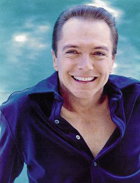
David Cassidy on the Web
Boomer Teenybopper Idols: Do Ya Love Me? I Think I Love You
July 1, 2013
http://misterboomer.com
Teen idols have been around at least since the 1920s, but it took the boomer era to elevate the marketing of idols to an early and pre-teen age. There were dozens of teen idols throughout the 1950s, '60s and '70s, as Mister B has discussed (Boomers Loved Their Teen Angels), but the addition of bubblegum pop music and magazines aimed at teenyboppers — pre-teenage girls especially — teen idols took on the status that became the foundation for what teen idols are today.
Boomers born late in the generational cycle, in the 1960s, weren't teenagers until the 1970s. Those born in the earlier part of the boomer era, in the late 1940s and early 1950s, had a different set of experiences growing up, as the new consumer society shifted gears from the end of the War and into President Kennedy's "Camelot" years. By the early 1970s almost everyone who could afford a TV had one, and it was a big influence on teenybopper fandom. There were two male idols that appear to show the changing times during the boomer generation: Bobby Sherman and David Cassidy. Which teen idol a young girl googley-eyed over was very much dependent on when she was born.
Bobby Sherman got on teenyboppers' radar with his first single in 1962,< em> Judy/You'll Never Know. The actor Sal Mineo took a liking to him, and in 1964 asked him to sing with his old band at a Hollywood party. Though reluctant to do so, Sherman did and the audience, peppered with producers and agents, took note of the young star's potential. As a result he obtained an agent, who got him a regular cast-member and house-singer role on ABC's music show, < em>Shindig! The show ran for two years, from 1964-66. While on < em>Shindig!, Sherman recorded several records and he turned up in all the teen magazines, and, though it gave him the exposure he needed to be kept front-of-mind for teenyboppers, he wasn't yet launched into superstardom.
In 1968 Sherman did a test for a TV role and as a result was cast as Jeremy Bolt in < em>Here Come the Brides (1968-1970). His character was a bashful, stammering logger that was an instant hit with the girls. Sherman was the standout star of the show and became a worldwide teen idol.
While his acting career took off, he continued to record. He appeared as a frequent guest on American Bandstand and Where the Action Is throughout the latter part of the 1960s. The song a great many boomers remember him for, < em>Julie Do Ya Love Me, debuted in 1970.
TV Guide ranked Sherman number 8 on their list of < em>TV's 25 Greatest Teen Idols in 2005.
Born in New York City in 1950, boomer David Cassidy made his acting debut in the Broadway musical The Fig Leaves Are Falling, in 1969. The show only lasted four performances, but a casting director took notice of the young man and asked him to do a screen test. Cassidy moved to Los Angeles and signed with Universal Studios that same year. Cassidy appeared in a guest role in several TV series, including < em>Ironside, Marcus Welby, M.D., Adam-12 and Bonanza.
In 1970 he was cast in the role that would make him a boomer household name, Keith Partridge on the TV show < em>The Partridge Family. Shirley Jones, Cassidy's real-life stepmom, was cast as Shirley Partridge. The producers of the show thought Cassidy's androgynous looks would be appealing enough, and didn't care if he could sing. It was Cassidy who convinced them he could play the part and sing the numbers himself.
David Cassidy released the top-selling hit for which he is widely known, I Think I Love You, in 1971. He went on to sell more than 30 million records and to star in the Broadway musical Joseph and the Amazing Technicolor Dreamcoat. He also appeared on London's West End.
The two men wore the hairstyles of their particular corner of the boomer years. Sherman's hair was longer, but not any more so than The Beatles. looking at their mop-top haircuts today, we can ask what all the fuss was about, but back then, their hair was long and different. Cassidy, however, sported more the later boomer style of wavy, shoulder-length locks that didn't become immensely popular until 1967's Summer of Love.
Both men also wore clothing that depicted boomer fashions of their time. Sherman, however, was not a boomer himself, being born a bit too early, in 1943. That may have affected his style of dress, which looked more early Beach Boys than later Beatles. He was often pictured in buttoned shirts or turtlenecks and slim dress pants. Cassidy, being an actor playing a role as a rock star, was dressed in large-collared shirts, vests and jeans.
Mister B's sister followed the men, but by far her favorite was Bobby Sherman. She did buy Cassidy's single, but Julie Do Ya Love Me could be heard on the family's box record player more often.
Which team were you — or your sisters — on back then, boomers… Team Sherman or Team Cassidy?
